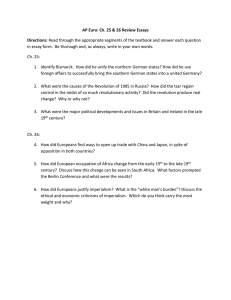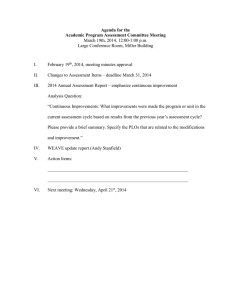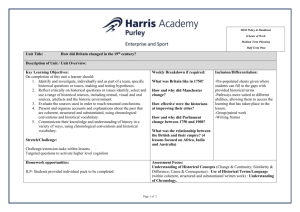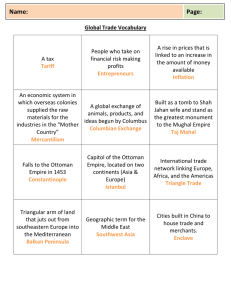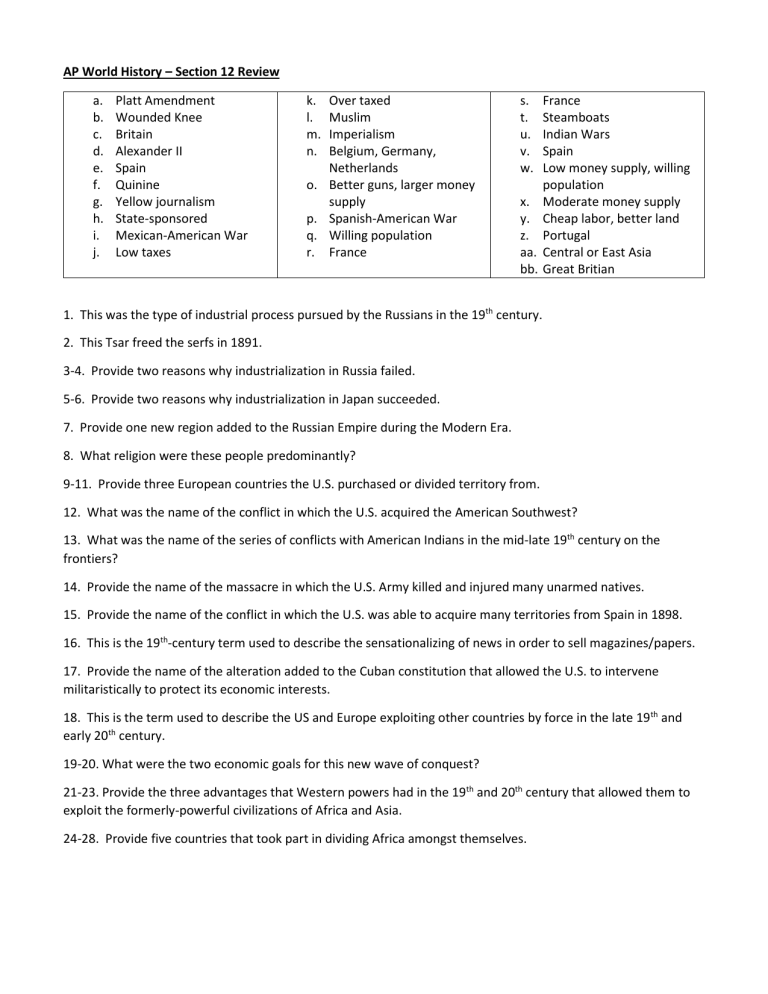
AP World History – Section 12 Review a. b. c. d. e. f. g. h. i. j. Platt Amendment Wounded Knee Britain Alexander II Spain Quinine Yellow journalism State-sponsored Mexican-American War Low taxes k. l. m. n. Over taxed Muslim Imperialism Belgium, Germany, Netherlands o. Better guns, larger money supply p. Spanish-American War q. Willing population r. France s. t. u. v. w. x. y. z. aa. bb. France Steamboats Indian Wars Spain Low money supply, willing population Moderate money supply Cheap labor, better land Portugal Central or East Asia Great Britian 1. This was the type of industrial process pursued by the Russians in the 19th century. 2. This Tsar freed the serfs in 1891. 3-4. Provide two reasons why industrialization in Russia failed. 5-6. Provide two reasons why industrialization in Japan succeeded. 7. Provide one new region added to the Russian Empire during the Modern Era. 8. What religion were these people predominantly? 9-11. Provide three European countries the U.S. purchased or divided territory from. 12. What was the name of the conflict in which the U.S. acquired the American Southwest? 13. What was the name of the series of conflicts with American Indians in the mid-late 19th century on the frontiers? 14. Provide the name of the massacre in which the U.S. Army killed and injured many unarmed natives. 15. Provide the name of the conflict in which the U.S. was able to acquire many territories from Spain in 1898. 16. This is the 19th-century term used to describe the sensationalizing of news in order to sell magazines/papers. 17. Provide the name of the alteration added to the Cuban constitution that allowed the U.S. to intervene militaristically to protect its economic interests. 18. This is the term used to describe the US and Europe exploiting other countries by force in the late 19th and early 20th century. 19-20. What were the two economic goals for this new wave of conquest? 21-23. Provide the three advantages that Western powers had in the 19th and 20th century that allowed them to exploit the formerly-powerful civilizations of Africa and Asia. 24-28. Provide five countries that took part in dividing Africa amongst themselves. a. Quinine j. First Sino-Japanese War b. Prince Gong k. Empress Cixi c. Agricultural based l. Selim III d. Korea and Taiwan m. British e. Sick man of Europe n. Social Darwinism f. Italians o. Commodore Perry g. Steamboats p. Iwakura Mission h. Democracy/constitution q. Berlin Conference i. King Leopold r. Meiji Restoration 29. Who was the king of Belgium that treated African colonists brutally? s. Self-strengthening Movement t. Factories or exclusive markets u. French, Balkans, Greeks v. Social Darwinism w. Factories x. Guns/ uniforms 30. This was the name of the agreement in 1884 to peacefully divide Africa amongst competing Europeans. 31. What was the name of the conflict in 1894 between Imperial Japan and China? 32. What were the two areas taken from China by the victorious Japanese? 33. China’s loss demonstrated the failure of China to industrialize on their own. What was the name of their attempt to industrialize? 34. Who advocated the Chinese attempt to industrialize? 35. Who opposed it? 36. Rather than conquer China and colonize it, the European powers and Japan setup spheres of influence in Qing China. Provide one thing they setup or built in China against the Qing government’s will. 37. What type of economy did the Ottoman Empire have in the 19th century? 38. Which sultan attempted to reform the Ottoman Empire? 39-41. List 3 countries who took land or won independence from the Ottoman Empire in the 19th or 20th century. 42. What was the nickname for the shrinking, industrialized Ottoman Empire in the 19th century? 43. What was the name for the philosophy that Europeans were biologically superior to other races of the world? 44. What was the name of the medicine that allowed Europeans to conquer the interior of Africa? 45. This was the invention that allowed Europeans to move upriver into Africa rather than rely on horses that were killed by tropical diseases. 46. Who forced Japan to open trade in 1853 (person)? 47. What was the name of the new Japanese government / era that took over when the Tokugawa shogunate ended in 1868? 48. What was the name of the mission to the US and Europe in which Japanese officials and scholars attempted to copy the West. 49. How did the Japanese copy the West politically? 50. How did the Japanese copy the West industrially? 51. How did the Japanese copy the West militaristically? a. b. c. d. e. f. Cotton Opium Tupac Amaru II Weapons Yaa Asantewaa Muhammad Ali g. h. i. j. Nationalized it Navy Opium wats Chinese wanted nothing from the British k. centralized l. Hong Kong and 4 other ports m. Sokoto 52. Who fought for independence from the Ottoman Empire in Egypt in 1867? 53. How did he industrialize the land taken from Mamluks? 54. What crop did he focus on producing? 55. How did he copy Western governments? 56-57. What two things did he focus on producing in port cities and factories? 58. What was the name of the wars fought between the British and Chinese in the mid 19th century? 59. What were the British attempting to sell the Chinese? 60. Why were the British attempting to sell the Chinese this controversial and illegal good? 61. What was the British reward for winning the second war? 62. This is the Asante Queen versus British colonialism in the 19th century. 63. This is the caliphate that formed in West Africa during the 19th century and expanded until it’s conquest by the British in 1903. 64. This was the anti-imperialist rebel in Peru who rebelled against Spain and adopting the name of the last Incan Emperor.
